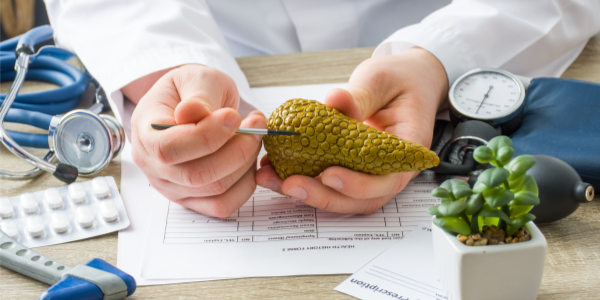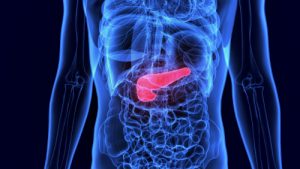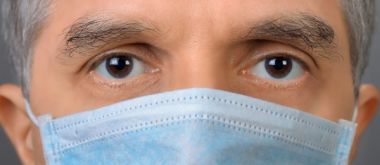COVID-19 is usually referred to as a respiratory disease, and while it does affect the lungs, it also seems to affect the heart, kidneys, testes and brain. More recently, doctors have discovered that COVID-19 affects the pancreas, impairing its function.
COVID-19 and Diabetes
The first hint that COVID-19 affects the pancreas came from reports that people with diabetes who contracted COVID-19 were more likely to have a severe form of the disease, and conversely, their diabetes would get worse while they were ill with COVID-19. Next came reports that patients who didn’t previously have diabetes were developing new-onset cases of diabetes after contracting COVID-19. At this point in time, it is not clear if these new-onset cases will eventually go away or become chronic. However, one study reported that the incidence of new-onset type I diabetes in children had dramatically increased since the pandemic started.
The ACE-2 receptor by which COVID-19 infects cells is expressed at high levels on the beta cells in the pancreas. Infection of the beta cells could cause them to malfunction, and the presence of a virus within these cells could cause the immune system to attack them. An immune attack on the beta cells is thought to be the cause of type I diabetes.
Symptoms of Diabetic Ketoacidosis
In many patients with COVID-19, the first sign of COVID-19 affecting the pancreas is the abrupt development of diabetic ketoacidosis. Until the pandemic is under control, people with and without diabetes should become aware of the symptoms of diabetic ketoacidosis and seek urgent medical help if they occur:
- Feeling very thirsty
- Urinating a lot
- Upset stomach
- Fruity smell on the breath
- Feeling weak, tired and short of breath
- Feeling confused
If you have access to home-testing kits, you will note a very high blood glucose level and high levels of ketone bodies in the urine.
 COVID-19 and Pancreatitis
COVID-19 and Pancreatitis
In addition to its well-known role in controlling blood glucose levels and sugar metabolism, the pancreas also plays a key role in producing digestive enzymes, which it releases into the intestine to aid in food breakdown and absorption. A condition that can be life-threatening is called pancreatitis. In pancreatitis, the pancreas becomes severely inflamed and may spill digestive enzymes into the abdominal cavity, causing damage and scarring. The symptoms of acute pancreatitis to be aware of include:
- Severe upper abdominal pain that may radiate to the back
- The pain is much worse after eating or drinking
- Nausea and vomiting, often severe
- Weak, rapid pulse
Acute pancreatitis usually resolves on its own, but sometimes it causes pseudocysts or chronic pancreatitis.
The causes of pancreatitis are diverse, but doctors have reported that some patients with COVID-19 have presented to the hospital with acute pancreatitis as their first symptom. Other doctors have noted that during hospitalization, around 35% of COVID-19 patients have symptoms of acute pancreatitis, and an additional 17% may have subacute pancreatitis. It is currently not clear whether COVID-19 affects the pancreas directly to cause pancreatitis, but the ACE-2 receptor is expressed on pancreatic ductal, ulnar and islet cells.
COVID-19 Affects the Pancreas
Laboratory studies have confirmed that the virus that causes COVID-19 can infect and replicate in most of the cell types found in the pancreas. In addition, postmortem studies of patients who succumbed to COVID-19 have also found direct evidence that the virus has infected the pancreas and is actively damaging it.
What You Should Do
During this pandemic, it is essential to be aware of the symptoms of diabetic ketoacidosis and acute pancreatitis in case you or a loved one develops them as a consequence of COVID-19 infection. In addition, if you have been diagnosed with diabetes, it is of utmost importance that you make sure your blood sugar is under control. If your blood sugar was previously under control and suddenly starts to increase for no apparent reason, this may be a sign that you have contracted COVID-19, which is affecting your pancreas and altering your metabolism.
Although there has been no consensus on this point among doctors, after recovering from COVID-19, even a very mild case, it might be wise to undergo regular checkups to make sure you aren’t showing signs of lingering damage to various organs or signs of developing pre- or even overt diabetes.

 COVID-19 and Pancreatitis
COVID-19 and Pancreatitis



